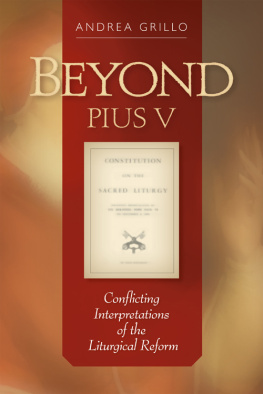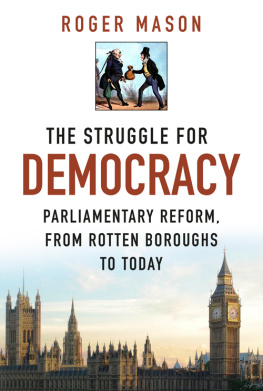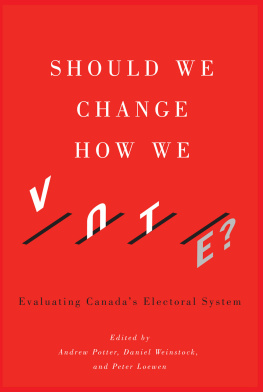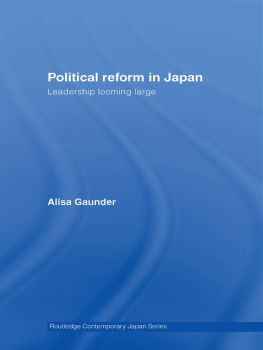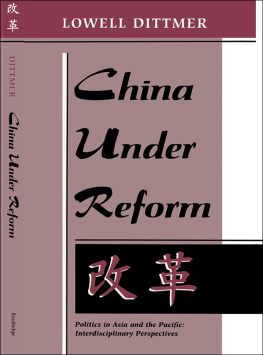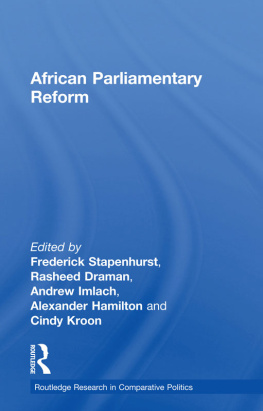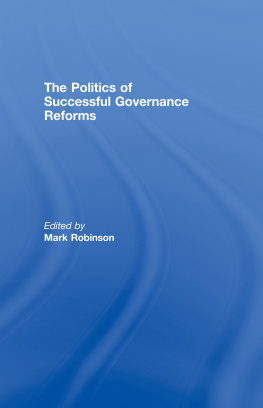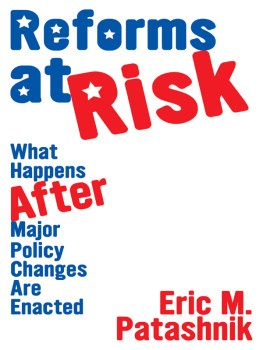Acknowledgments
The arguments of this book intervene in the public discussion of its several subjects in the media and politics. I have researched the academic and historical literature. All this appears in the notes.
But I want to acknowledge the help of Richard Lubbock, broadcaster, journalist, and curious citizen, who first put me onto the paradox of voting, Condorcet, Arrow etc.; H. Donald Forbes of the Department of Political Science at the University of Toronto, with whom I had fruitful discussions as the work progressed; and poet, lexicographer, and editor Fraser Sutherland, who gave me stern advice and encouragement.
The University of Toronto Centre for Public Management Monograph Series
The Klein Achievement / Barry Cooper
Expanding Horizons: Privatizing Post-Secondary Education / Douglas Auld
The McKenna Miracle: Myth or Reality? / William Milne
Cure or Disease: Private Health Insurance in Canada / Steven Globerman and Aidan Vining
How Ottawa Rewards Mediocrity / Fred Lazar
From Heartland to North-American Region State: The Social, Fiscal and Federal Evolution of Ontario / Thomas Courchene with Colin Telmer
The Federal Government and the Prairie Grain Sector: A Study of Over-Regulation / Colin Carter and Al Loyns
Reducing, Reusing and Recycling: Packaging Waste Management in Canada / Donald Dewees and Michael Hare
Past (In)Discretions: Canadian Federal and Provincial Fiscal Policy / Ronald Kneebone and Ken McKenzie
Governing in Post-Deficit Times: Alberta in the Klein Years / Barry Cooper and Mebs Kanji
Canada and Foreign Direct Investment: A Study of Determinants / A. Edward Safarian and Walid Hejazi
Liquid Assets: Privatizing and Regulating Canadas Water Utilities / Elizabeth Brubaker
Private Health Care in the OECD: A Canadian Perspective / Philippe Cyrenne
If You Build It Business, Government and Ontarios Electronic Toll Highway / Chandran Mylvaganam and Sandford Borins
The Economics of Genetically Modified Wheat / Colin Carter, Derek Berwald, and Al Loyns
Greener Pastures: Decentralizing the Regulation of Agricultural Pollution / Elizabeth Brubaker
Toronto Sprawls: A History / Lawrence Solomon
Against Reform / John Pepall
1 Introduction
This book attacks each of the several radical changes to our political institutions and procedures that have, under the name of reform, been promoted in Canada in the last two decades. Some have already been adopted and several are on the national or provincial agenda. Fixed election dates have been adopted in Ottawa and seven provinces and one territory. We have had our first judge hauled before members of Parliament before ascending to the Supreme Court. Recall and Initiative legislation was passed in British Columbia in 1995. Senators may be about to be elected, sort of. In several provinces electoral reform has been proposed, and there have been four referendums on it.
Each reform is fuelled by particular pressures and misunderstandings and presents particular dangers. I deal with each briefly or at length, as its importance and complexities indicate. But though each stands or falls on its own, has its particular proponents, and may, both in theory and in practice, conflict with others, powerful common influences propel them forward.
We have forgotten how and why our political institutions came to be. The media, academics, and politicians have a bias towards change, and the mass of people who are content with our institutions are quiet, while those keen on change will not be quiet. We are distracted by the spectacle of American politics. Most importantly we misunderstand democracy and, in the hope of getting what we think the people want, risk the people losing control of government.
Oblivion
Decade after decade, elections were held, governments were formed, went about their business, and fell, under the rules and conventions that are now almost all under attack. There were great political controversies, wars and depressions, conflicts within the country, but claims that our political institutions were flawed were not heard. Vast material and arguable social progress took place. There was a general belief that we had happily inherited and developed sound institutions. We ought not lightly to put aside what was so long thought to work well. But a century and more of content with our political institutions is forgotten in the general oblivion of Canadas past.
Behind Canadas experience with our existing political institutions lie centuries of political evolution in Britain. Very little of this was the result of conscious political theory. By a process of trial and error, institutions were developed that provided effective government answerable to the people. Two generations ago that history and the achievements of the governments it led to were well known in Canada. They too have passed into oblivion.
It was once understood that our political institutions were a primary part of who we are and an object of pride. In the remaking of Canada, at once aggressive and surreptitious, in the last forty years this understanding has been suppressed. How and why our existing institutions came to be and why thoughtful people in the past defended them is hardly taught in schools and universities.
When the issue of confidence is raised in the House of Commons it is treated as if it arose from some arcane rule, perhaps medieval, as most things old and not understood are supposed to be. In fact it is perfectly simple and practical. We must have a government, and that government, to govern, must generally be able get its measures, particularly its financial measures, through the House of Commons. It is through the popularly elected House of Commons that practically we choose our government. But the Commons in choosing a government assumes a responsibility to support it, to give it its confidence. If it will not support it, it must either find and support another government in the existing House or be dissolved so that another House of Commons can be elected that will support a government.
Whether a government has the confidence of the Commons is a matter of judgment, easy enough in most cases, when a confidence motion has been won or lost, but not requiring experts to decide, even when it is difficult. It is only because a basic understanding of how our institutions work, and they do work, has been lost that something so simple can seem technical.
With all understanding of our political institutions, and all confidence in and respect for our past gone, our political institutions become vulnerable to any novelty. The constitutional wrangling of the 1980s, whose object was to resolve the problem of Quebec, opened arguments about the Senate and the Supreme Court. They led to nothing. Exhaustion put the constitution off the political agenda for the foreseeable future. But a taste for tinkering with our political institutions remained.
Professional Bias
There is a journalistic bias towards reform. Calls for reform of our political institutions are a staple of the comment pages in the newspapers. Editors like an argument that something is wrong and changes are needed. Every time there has been a Supreme Court vacancy, and often when there has not, articles have been printed calling for some kind of parliamentary confirmation of judicial appointments. Some law professors have got to make the same argument several times. An argument that all is well and no change is needed does not seem to merit space. Only after several arguments for reform have appeared is an argument against reform admitted as a novelty.


